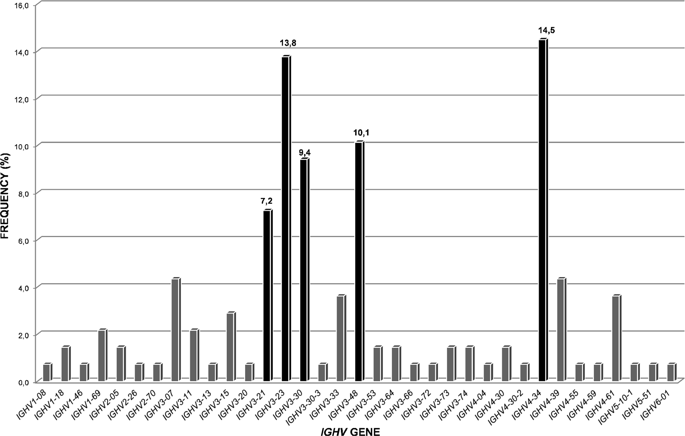Blood Cancer Journal ( IF 12.8 ) Pub Date : 2019-06-17 , DOI: 10.1038/s41408-019-0213-9 María García-Álvarez 1 , Sara Alonso-Álvarez 2 , Isabel Prieto-Conde 1 , Cristina Jiménez 1 , M Eugenia Sarasquete 1, 3 , M Carmen Chillón 1, 3 , Alejandro Medina 1 , Ana Balanzategui 1 , Rebeca Maldonado 1 , Alicia Antón 1 , Noemí Puig 1, 3 , Marta Rodríguez 4 , Oscar Blanco 4 , Pilar Tamayo 5 , Verónica González-Calle 1 , Alejandro Martín 1, 3 , Ramón García-Sanz 1, 3, 6 , Marcos González 1, 3, 6 , M Dolores Caballero 1, 3 , Miguel Alcoceba 1, 3

|
Follicular lymphoma (FL) is a heterogeneous disease whose pathogenesis remains partially unknown. Around 20% of FL patients experience early progression or treatment-refractory disease and 2–3% of patients per year experience histological transformation (HT) into a more aggressive lymphoma (tFL). Here, we evaluate the immunoglobulin heavy chain variable (IGHV) gene usage and mutational status in 187 FL cases to assess its impact on clinical outcome and histological transformation. The IGHV gene repertoire was remarkably biased in FL. The IGHV4-34 (14%), IGHV3-23 (14%), IGHV3-48 (10%), IGHV3-30 (9%) and IGHV3-21 (7%) genes accounted for more than half of the whole cohort. IGHV3-48 was overrepresented in cases of tFL (19%) compared with non-transformed FL at 5 years (5%, P = 0.05). Patients with the IGHV3-48 gene were significantly more likely to have had HT after 10 years than those who used other genes (71% vs. 25%, P < 0.05), irrespective of the therapy they received. Moreover, IGHV3-30 was also overrepresented in cases of FL (9%) and tFL (13%) compared with diffuse large B-cell lymphoma in which it was nearly absent. In conclusion, our results indicate a role for antigen selection in the development of FL, while the use of IGHV3-48 could help predict histological transformation.
中文翻译:

免疫球蛋白基因重排IGHV3-48是组织学上转化为滤泡性淋巴瘤中侵袭性淋巴瘤的预测标志物。
滤泡性淋巴瘤(FL)是一种异质性疾病,其发病机理仍部分未知。大约20%的FL患者经历早期进展或难治性疾病,每年2-3%的患者经历组织学转化(HT)转变为更具侵略性的淋巴瘤(tFL)。在这里,我们评估了187例FL患者的免疫球蛋白重链变量(IGHV)基因使用情况和突变状态,以评估其对临床结局和组织学转化的影响。所述IGHV基因所有组成成分在FL得到显着偏置。所述IGHV4-34(14%),IGHV3-23(14%),IGHV3-48(10%),IGHV3-30(9%)和IGHV3-21(7%)基因占整个队列的一半以上。IGHV3-48在TFL(19%)的例非转化的5年FL(5%,相比过多P = 0.05)。与接受其他基因治疗的患者相比,具有IGHV3-48基因的患者在10年后出现HT的可能性明显高于使用其他基因的患者(分别为71%和25%,P <0.05)。此外,与几乎不存在的弥漫性大B细胞淋巴瘤相比,IGHV3-30在FL(9%)和tFL(13%)病例中也存在过多。总之,我们的结果表明抗原选择在FL的发展中发挥了作用,而IGHV3-48的使用可以帮助预测组织学转化。


























 京公网安备 11010802027423号
京公网安备 11010802027423号